Potassium-Rich Fruits to Boost Your Potassium Levels Naturally
By Dr. Vishesh Bharucha +2 more

Get,

to manage your symptom
Get your,


4 Cr+ families
benefitted

OTP sent to 9988776655



You’ve successfully subscribed to receive
doctor-approved tips on
Whatsapp

Get ready to feel your best.

Hi There,
Download the PharmEasy App now!!


Register to Avail the Offer
Send OTPBy continuing, you agree with our Privacy Policy and Terms and Conditions

Hi There,
Sign up on PharmEasy now!!
Trusted by 4 crore+ families

OTP sent to 9988776655



You have unlocked 25% off on medicines




Code: NU25
By Dr. Vishesh Bharucha +2 more
Table of Contents
Have you been feeling sudden weakness or rapid heartbeats? It might be more than just fatigue. While not always the case, these symptoms can point to hypokalaemia, a condition marked by low levels of potassium in the blood (serum)1,2.
Potassium is an important mineral and the most abundant positively charged ion (cation) inside the cells of our body. It plays a key role in cell function, muscle contraction, and heart rhythm regulation3. Low potassium levels are often linked to underlying conditions such as endocrine disorders. However, it can also result from poor or insufficient dietary intake1.
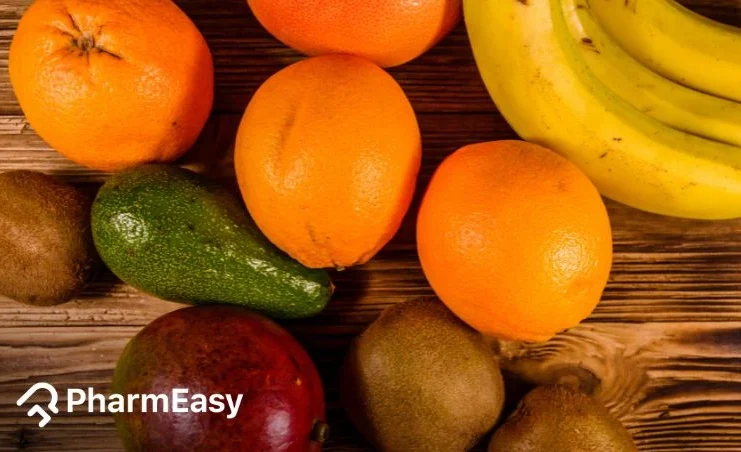
In this article, we will explore some healthy and delicious fruits high in potassium that can help boost its levels in the body. These potassium rich fruits not only offer a tasty way to support your electrolyte balance but also contribute to overall well-being.
Potassium is a mineral and electrolyte that plays a central role in maintaining the proper functioning of cells, particularly in muscles and nerves. It is crucial for regulating muscle contractions, nerve signals, and intracellular fluid balance4. A deficient or insufficient potassium level can cause symptoms such as muscle weakness, fatigue, and constipation3.
Its importance extends beyond basic cellular activity. Higher potassium intake is associated with significant health benefits, particularly for heart health5. One major meta-analysis involving around 250,000 participants found that for every 1.64 grams (or around 42 millimoles) of daily potassium intake, there was a 21% reduction in stroke risk and a notable trend toward reduced overall cardiovascular disease6.
In short, potassium supports critical bodily functions, especially heart, muscle, and nerve performance, while also helping to protect against serious conditions like stroke and heart disease. Therefore, ensuring adequate potassium in your diet through fruits high in potassium is a simple but powerful step toward better health!
Hyperkalaemia can cause muscle weakness, fatigue, nausea, vomiting, diarrhoea, and cardiac arrhythmias. Thus food-drug interactions must be kept in mind if individuals are already on medicines that increase potassium levels.
Dr. Nayana Shetty, MBBS, MD
The amount of potassium an individual needs in a single day depends on age, sex, and life stage.3 According to the National Academies of Sciences, Engineering, and Medicine (NASEM), here are the recommended Adequate Intakes (AIs):
The potassium AI for children varies specifically by age group7:
Note: These recommendations do not apply to people with kidney disease or those taking medications that affect potassium levels8. For personalised advice on optimal intake, it’s best to consult your doctor.
If you’re concerned about a potential potassium deficiency, a simple blood test, such as the Potassium (K+) Test, can help evaluate your potassium levels.
Potassium is required for several bodily functions. These include:
Adequate potassium helps regulate blood pressure by promoting natriuresis (sodium excretion) and reduces vascular resistance, which helps lower blood pressure3,6. This might contribute to reducing the risk of hypertension and stroke.
Potassium works with sodium to maintain fluid balance in the body3. This helps cells function properly and supports overall hydration.
Potassium supports smooth muscle function, including the muscles of the digestive tract9. This may aid in regular bowel movements and avoid constipation.
Higher potassium intake (especially from fruits) may reduce calcium loss in urine10. This helps in lowering the risk of calcium-based kidney stones.
Potassium from fruits may help maintain bone mineral density by reducing the acid load in the body11. This helps in minimising calcium loss and supports bones.
Potassium plays a role in insulin secretion, and low levels have been linked to an increased risk of type 2 diabetes in some studies12. However, more research is still needed to directly establish a link between potassium intake and its benefits for diabetic patients.
Fruits are an excellent natural source of potassium, offering a variety of health benefits.
In recent decades, shifting dietary habits, marked by increased intake of processed foods and reduced consumption of fresh fruits and vegetables, have contributed to several health issues, including a widespread decline in dietary potassium intake, despite its critical role in maintaining cardiovascular and muscular health5.
Which fruit contains the most potassium is a common question for those looking to boost their potassium intake naturally. Therefore, to naturally support optimal potassium levels, we have compiled a list of fruits containing high potassium for you:
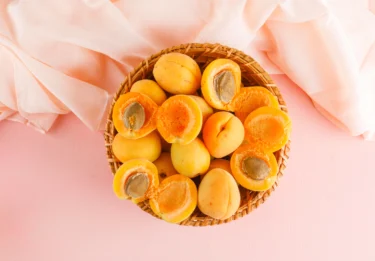
Dried apricots are highly concentrated in potassium; a half cup serving provides 755 mg of potassium, which is around 22% of the daily recommended intake3. Besides potassium, apricots are also rich in carotenoids like β-carotene, which acts as a strong antioxidant and may help lower oxidative stress, support immunity, reduce the risk of heart disease, and protect eye health with age13.
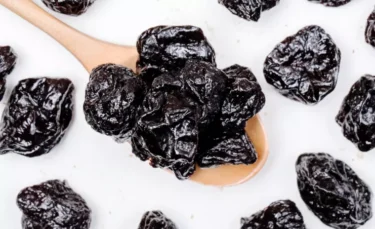
Prunes are rich in potassium; half a cup of dried prunes contain 635 mg of potassium, covering around 19% of the daily recommended intake.3 Prunes are also rich in fibre, sorbitol, and antioxidants. Due to these nutrients, they may also help improve digestion and support bone besides heart health14.
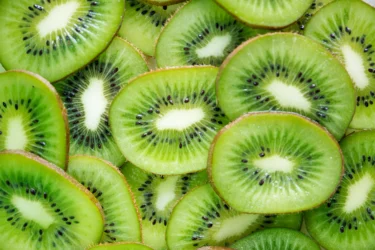
Kiwi provides abundant potassium; one cup of sliced kiwi contains about 562 mg of potassium, about 16.5% of the daily value15. Besides potassium, kiwifruit is also rich in vitamin C, fibre, and antioxidants. Eating them regularly may boost your immune system, support digestion (thanks to an enzyme called actinidin), and improve overall metabolism16.
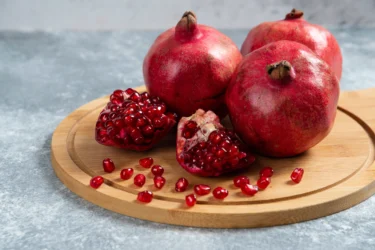
Pomegranates are a good source of potassium; one cup of 100% pomegranate juice provides approximately 533 mg of potassium, contributing about 15.7% of the daily recommended intake15. Drinking pomegranate juice can help reduce oxidative stress and support heart health by slightly improving blood pressure and related risk factors17.
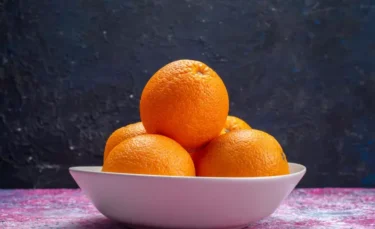
Orange juice is a natural source of fruits high in potassium; one cup of orange juice delivers 496 mg of potassium, about 14.6% of the daily recommended intake3. Regular consumption of 100% orange juice may help reduce inflammation in healthy people and those at risk for chronic diseases18.
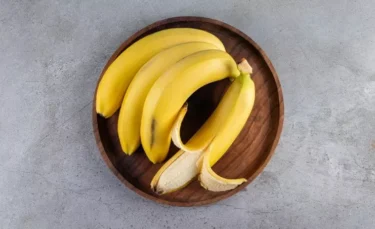
Bananas are well known for their potassium content; a medium banana contains 422 mg of potassium, which is around 12.4% of the daily recommended intake3. A study19 has shown that eating 250 g of bananas before haemodialysis (a process of filtering blood in patients with impaired kidneys) helps avoid low potassium and heart rhythm problems without causing high potassium.
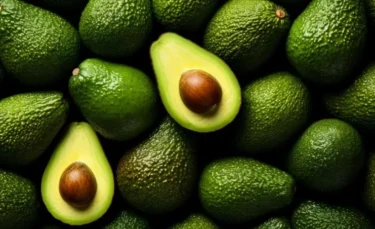
Avocados are rich in potassium; half a piece of avocado contains about 345 mg of potassium, which is around 10% of the daily recommended intake20. Based on a preliminary, uncontrolled study21, adding California avocados to your daily diet may help lower total cholesterol and aid in controlling body weight.
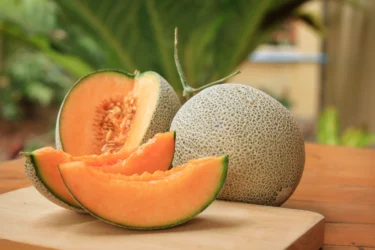
Cantaloupe is a refreshing fruit rich in potassium; half a cup of cubed cantaloupe supplies 214 mg of potassium, or 6.3% of the daily recommended intake.3 Besides potassium, cantaloupe is packed with essential vitamins and minerals that help keep you hydrated with its high-water content. This makes it a tasty and refreshing part of a healthy diet22.
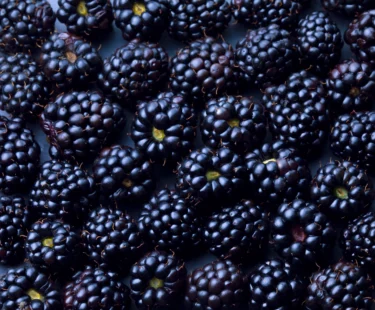
Blackberries are a good source of potassium; one cup of blackberries contains about 211 mg of potassium, contributing around 6.2% of the daily recommended intake16. Blackberries are also used traditionally for diarrhoea, ulcers, inflammation, and diabetes. They are also rich in anthocyanins, which help reduce pain and may have antioxidant effects that contribute to reducing inflammation and supporting general health23.
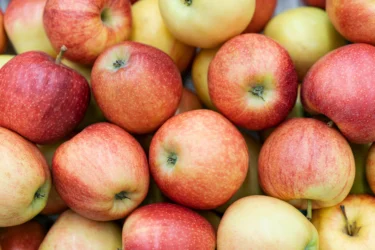
Apples contain moderate potassium levels; one medium apple with skin provides 195 mg of potassium, approximately 5.7% of the daily recommended intake3. Besides potassium, apples are also rich in antioxidants, especially polyphenols, which help reduce oxidative stress and inflammation. They also support gut health by improving the balance of beneficial gut bacteria24.
Knowing the potential benefits and the potassium content in fruits helps you choose the best options to support your health and meet your daily potassium needs. While consuming these fruits is generally healthy, remember some fruits may increase blood sugar levels. Therefore, it’s best to consult with a diabetologist before including them in your routine diet (especially if you are diabetic or at risk).
In case you are a diabetic patient apart from risk of hyperkalaemia there could be a risk of causing glucose spikes while incorporating fruits like banana etc. into your diet with the aim to improve its potassium content. Make sure to do so in a way that your blood glucose levels remain stable. Preferably consult your doctor before doing so and consume the fruits whole with fibre (like seeds or salad) or yogurt to lower the glucose spike.
Dr. Nayana Shetty, MBBS, MD
Also Read: PDW Blood Test: Understanding Its Purpose and Results
Including potassium-rich fruits in your diet is not at all complicated. You can consume the fruit raw or make some simple and delicious dishes with them to boost your intake25:
It should be noted that including fruits containing high potassium in the diet helps maintain potassium balance only when potassium levels are slightly below the normal range or for when an individual is at risk. Dietary potassium is not an alternative for moderate or severely low potassium levels; these conditions often require oral or intravenous potassium supplementation.
Also Read: 8 Types Of Food That Can Help You Fight Anaemia!
While potassium is essential for health, increased levels can be dangerous. Excess potassium levels, known as hyperkalaemia, may lead to serious symptoms, including neuromuscular issues such as fatigue, muscle weakness, and paralysis. It may also lead to cardiovascular symptoms, such as irregular heartbeats or even cardiac arrest1,3.
However, it should be noted that fruits (or even other dietary sources) rich in potassium alone rarely cause hyperkalaemia in healthy individuals. Hyperkalaemia typically results when there is impaired renal excretion or a shift of potassium from cells into the bloodstream.
Certain individuals should be cautious when consuming high-potassium diets or potassium supplements. These include:
Due to the above-mentioned reasons, individuals with underlying health conditions or those on long-term medication should consult a doctor before making any changes to their potassium intake to ensure a safe and balanced dietary approach.
Sometimes patients have too much coconut water regularly, which can lead to high potassium. It is important to consume it in moderation to prevent side effects of excess potassium27.
Dr. Nayana Shetty, MBBS, MD
Also Read: What Causes High Vitamin B12 Levels & How to Manage It
Potassium is a vital mineral that plays a crucial role in maintaining healthy blood pressure, supporting muscle and nerve function, and promoting overall heart health. Fruits are a natural and wholesome source of potassium, making them a safe and effective way to meet daily needs, especially when included as part of a varied and balanced diet. Incorporating potassium rich fruits in the diet, such as bananas, apricots, prunes, and oranges, offers not only this essential nutrient but also other valuable nutrients that contribute to overall wellbeing. They are generally safe and very rarely cause hyperkalaemia in healthy people with normal kidney function. However, individuals with impaired kidney function or those taking certain medications should be cautious and consult a doctor before increasing their potassium intake. That said, a balanced approach in diet (consuming a combination of fruits, vegetables, and whole foods) can be a great way to support the potassium requirements of the body and at the same time offer broader health benefits, reinforcing the importance of nutritious and mindful eating to achieve your health goals.
Yes, both dried and frozen fruits retain potassium, though portion sizes vary26. Dried fruits are more concentrated, so smaller amounts provide similar potassium levels.
You should take potassium supplements only under medical advice, since most people can meet their potassium needs through a balanced diet rich in fruits, vegetables, and legumes3. Talk to your doctor if you believe you might need potassium supplements.
If you are healthy, you cannot overdose on potassium from fruits, as the kidneys eliminate excess potassium through urine. However, people with kidney disease or on certain medications need to be cautious3. Remember moderation in consumption is key.
No, they are not suitable for everyone since salt substitutes often contain high levels of potassium. People with kidney disease or those taking certain medications should consult their doctor before using them to avoid the risk of hyperkalaemia (dangerously high potassium levels)3.
Fruits provide important nutrients like folate and vitamin C, potassium, and dietary fibre. They help keep your digestion healthy, lower the risk of heart disease, diabetes, obesity, and even some cancers. They are also low in fat and calories, especially when not fried or roasted. Aim to include a variety of colourful fruits in your diet. This will give you a range of nutrients24.
27. Hakimian J, Goldbarg S, Park CH, Kerwin TC. Death by Coconut. Circulation: Arrhythmia and Electrophysiology. 2014;7(1):180–181. doi:10.1161/CIRCEP.113.00094. Available from: https://www.ahajournals.org/doi/10.1161/circep.113.000941
Disclaimer: The information provided here is for educational/awareness purposes only and is not intended to be a substitute for medical treatment by a healthcare professional and should not be relied upon to diagnose or treat any medical condition. The reader should consult a registered medical practitioner to determine the appropriateness of the information and before consuming any medication. PharmEasy does not provide any guarantee or warranty (express or implied) regarding the accuracy, adequacy, completeness, legality, reliability or usefulness of the information; and disclaims any liability arising thereof.
Comments

Leave your comment...
You may also like
Comments